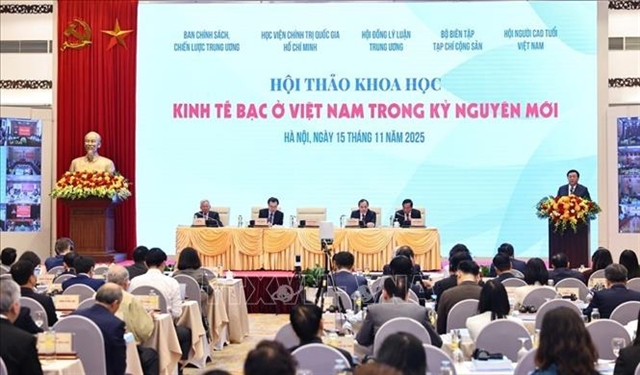 Economy
Economy


|
| Participants at the forum. — VNA/VNS Photo |
HÀ NỘI — Việt Nam is moving to position its rapidly growing elderly population as a new source of economic growth, as policymakers warn that the country is entering one of the fastest ageing phases in Asia.
At a national forum on the silver economy in Việt Nam on Saturday, Politburo member and Director of the Hồ Chí Minh National Academy of Politics Nguyễn Xuân Thắng said the country must shift from viewing ageing as a welfare burden to recognising older people as an economic asset.
Việt Nam’s demographic structure is changing rapidly, with people aged 60 and over set to account for more than 14 per cent of the population by 2025. The country is expected to become an aged society within the next decade.
At a recent meeting on Resolution 72, Party General Secretary Tô Lâm emphasised that while children are vital, older people are no less important, urging policymakers to address senior loneliness as a key strategic priority.
The “silver economy” refers to economic activities, products and services designed to meet the needs of an ageing population, turning demographic transition into a potential driver of growth.
Thắng said Việt Nam’s approach to the silver economy should focus on modernising eldercare services, improving quality of life, upgrading health and rehabilitation systems, and enabling skilled older workers to continue contributing voluntarily.
He also highlighted opportunities in sectors such as home-based care, senior-friendly housing, high-quality nursing services, digital health and lifelong learning, stressing that private investment and technology will play a key role.
Speaking at the event, National Assembly Vice Chairman Lê Minh Hoan said the ageing population represents a “vast reservoir of knowledge and experience” that can support economic and social development.
He urged the Government to develop a national strategy for the silver economy, set targets for its contribution to GDP, expand age-friendly infrastructure and support businesses producing products and services tailored to older consumers.
Experts at the forum called for more flexible labour policies, skills training for older workers, tax and credit incentives for eldercare enterprises, and investment in senior tourism, cultural centres and digital platforms.
They also stressed the need to modernise data systems and urban infrastructure to make cities more accessible for an ageing population.
The forum highlighted the need to tap seniors’ knowledge and labour through part-time work, consulting roles and community networks that allow older people to share experience with younger generations.
They said changing public perceptions and promoting active, meaningful ageing are essential to turning demographic ageing into an economic and social opportunity, creating what they described as a “golden autumn” for society. — BIZHUB/VNS




